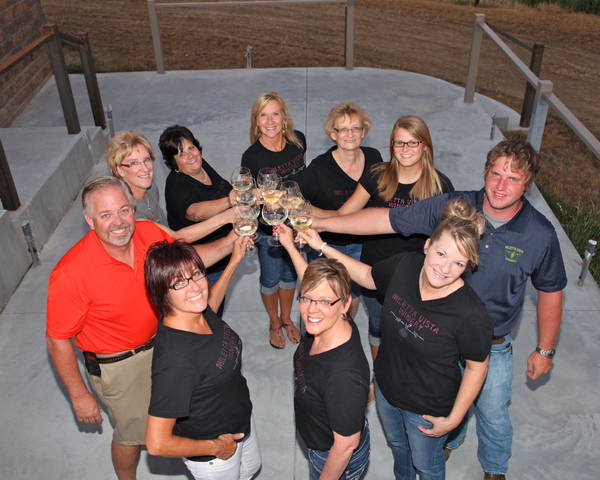Young Entrepreneurs Succeed at Prairie Creek Vineyards
It’s a warm Friday night in central Nebraska and at Prairie Creek Vineyards the dining area is packed full. Folks have come from miles around, including from Grand Island (30 miles), and Red Cloud (70 miles). Among a large group of friends catching up, the loudest and most contagious laugh is Kristen Ryan’s, the co-owner. And the quiet hand continuously topping off glasses with fruity Edelweiss, Brianna and, yes, Sweet Ass Wine, is co-owner and winemaker Nick Ryan.
‘We’re not a stuffy winery,” Nick says. ‘We like to have people out here who want to have fun. The memory of having a good time and having a good bottle of wine brings that customer back again and encourages them to buy that wine off the retail shelf.”
‘Most people are not newbies anymore as far as Nebraska wine,” observes Nick. ‘Really, we’re [Prairie Creek] out in the middle of nowhere, and the people here have made the point to come here. They already know a little about us or they have been invited by a friend who does. Word of mouth is really how we make a living.”
“I think Nebraska has the potential to have some really world-class wines.”
Nick Ryan, co-owner and winemaker, Prairie Creek Vineyards
Prairie Creek is located off the beaten path in rural Merrick County (see map below.) The 7 acre vineyard has 2500 vines and currently produces 4500-5000 gallons per year. Nick earned degrees in agriculture economics and business from the University of Nebraska and started the winery when he was 28 years old. ‘I knew I wanted to come home and farm,” he says. ‘I was looking for a crop that would fit what we have, and we have dry sandy soil that didn’t grow corn well, so we put grapes on the worst soil and they flourish. I mean they really do well here.”
The Wine
Nick’s approach to grape growing and harvesting can be described as “no fuss,” with as little interference in the natural process as possible. His key grape growing techniques include moderate fertilization, netting all grapes for bird protection, a good fungicide spray program and canopy control. Over ten years, he has sprayed only for leaf hoppers, and then only twice, and he’s on a 10 to 14 fungicide spray cycle.
Once the grapes are harvested, Nick says he follows what he calls the “basic rules of winemaking” and doesn’t try to turn his grapes into wines “they really shouldn’t be.”
That includes guarding against oxidized wine. ‘I allow as little oxidation as possible” he says. “In our winery, dry ice is our friend; so is lots of cool air and CO2.” All tanks at Prairie Creek are stainless steel and no oak barrels are used. Instead, oak cubes or a malolactic fermentation are used to enhance flavors.
‘And you know what, we make good wines here, we really do,” he says proudly. “We do better with whites and blushes than we do reds; but, the red varietals in the warmer climates, they’ve been working on those vines for 2000 years! We’ve been working on North American hybrids for 60 years.”
In Nebraska’s cold climate, Nick says there are grape varieties that grow well. He says that he “can’t kill” LaCrosse and mentions Brianna, St. Vincent and Frontenac as other good growers at Prairie Creek. He’s very positive about the wine being made across the state, which he describes as “user-friendly” and adds, “I think Nebraska has the potential to have some really world-class wines.”
Nick says the best wine made at Prairie Creek is the Seyval blanc, a semi-dry white. Seyval is at the edge of its range in a 5a/5b growing zone like central Nebraska. Nick says he has to replace about 5% of his Seyval vines each year.
Prairie Creek also makes a Traminette desert wine, sourcing the grapes from a vineyard 90 miles southeast in the Lincoln area. They produce one dry red from the Marquette grape, but their sweet and semi-sweet reds – St.Vincent and Red Stiletto respectively – sell much better. ‘We have one typical dry red that you can compare to a Pinot Noir” says Nick. “We just don’t have the demand for dry red in Nebraska.”
One thing that makes Nebraska unique in the upper Midwest, says Nick, is the 25 percent rule requiring Nebraska wineries to source 75 percent of their grape juice from within the state. Prairie Creek grows 50 percent of the grapes used in their wine and works with 6 or 7 outside growers to provide the rest. This year, despite frosts and drought, they’ve managed to observe the 75% locally grown rule. “If there is a spring freeze next year, the entire state will be hurting. Statewide, the yield is down at least a third this year.”
The Nebraska growing season can vary widely. Harvest typically starts around mid-July and concludes at the end of August. However, harvest has started as late as September and, this year, harvest is the earliest in 10 years for Prairie Creek. Bud break was way back on April 10.
‘We never run into ideal conditions across the state,” says Nick. ‘Other elements we struggle with are the spring frost, someone is always getting hail, and we’re always getting wind during pollination.”
Nick says the relationship between Nebraska wineries is very cooperative and supportive. “You want to help each other out. We’re all competitors, but we learn from each other,” he says. “You never know when the consumer is going to pick up their very first bottle of Nebraska wine and, if it’s a bad bottle, that may turn them off from ever having a Nebraska wine again.”
‘It might sound a little corny, but we’d just be happy if everybody succeeded,” says Nick. ‘We are competitors, but we’re better as a good industry than a bunch of individuals.” Nick credits most local wineries with a similar degree of good will. He says many would be happy to spend time with someone starting out in the winemaking business, especially if that person was willing to help around the vineyard during harvesting time!
Prairie Creek’s winemaker says the best thing he and Kirsten did was start the winery with small expectations. “Year one, 550 gallons is what we produced. Year two, it was 1100 and then we hit 2000. I’m thrilled with 500 to a 1000 gallons annual growth. We haven’t over extended ourselves.” They’ve also enjoyed themselves. ‘You don’t make it this long in the industry unless you like what you’re doing, and I like what I’m doing,” Nick says.
Prairie Creek does custom crush work for local wineries that bring their grapes in: Cedar Hills in Ravenna, Neb.; The Pour House in Friend, Neb.; and The Blue Stem in Crete.
Prairie Creek is also helping Miletta Vista Winery process wines in its facility after a recent fire devastated the Miletta Vista facility and tasting room in nearby St. Paul, Neb.
Nick and Kristin can be found at Prairie Creek every Friday night. Kristin owns her own dental practice in Central City. Nick also does professional pipe organ repair and tuning.
[wp_geo_map]





